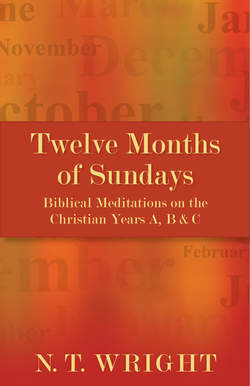Читать книгу Twelve Months of Sundays - N.T. Wright - Страница 25
На сайте Литреса книга снята с продажи.
ОглавлениеThe Second Sunday Before Lent
Genesis 1.1—2.3
Romans 8.18–25
Matthew 6.25–34
The project was all set up and ready to go. Creation was more like a perfect studio than a finished painting; everything was there, paints, canvas, artist, and all. It had its own inbuilt rhythm and drama, its own sources and signs of life: notice the emphasis on the seed in vv. 11–12, and on the command to be fruitful in vv. 22, 28. Paradise it may have been, but it was just the start, the opening scene of the play.
Part of it seems play in a different sense. What sort of a skittish God makes giraffes and chilli peppers, sun and moon and sesame seeds? But the six-day sequence ends with solemn glory. Into the studio the creator places a working model of himself. These creatures are to carry forward the project, to paint the picture. They are to act out the creator’s intention, reflecting into the rest of the new-made world the play and the purpose, the very image and likeness, of their maker.
Has the lectionary turned over a new leaf? Do we really get the whole story? A glance at Lent indicates that this is no flash in the pan …
But you need more than a whole chapter to get the point of Romans 8. We come crashing in at the climax, like somebody turning on the radio just as Nimrod states its theme for the last time. Paul has spent eight chapters preparing for just this moment. Jesus the Messiah has been obedient to God’s Israel-shaped play and purpose. Israel’s mistake had been to suppose the play was all about herself. It wasn’t. Israel’s task was to redeem the rest of the world; Jesus has accomplished it. God forgive us, we have often supposed that the plan, the play, was all about us humans. It wasn’t. The human task was to reflect God’s image into the whole of creation, painting on God’s canvas the living signs of powerful, sovereign love. So when Jesus accomplished his great saving act, humans were delivered from death; and when humans then share God’s solemn glory, creation itself will be set free for its original purpose. It can’t wait.
Underneath all this is a principle that cuts deeply across some current assumptions. Creation was made to flourish when looked after by humans. Humans were made to reflect the image of the creator into the world. Freedom isn’t throwing off all constraint. It’s finding what you were made for, and being obedient to that and nothing else. It will always be costly; that’s part of the point, part of reflecting the image of God now seen in Christ (v. 29).
Inside this again, waiting to be rediscovered by our rushing, restless age, is the strange glory of the sabbath. Look at it this way: if even God took a day off, why do you need to worry? Look at the signs of God’s relaxed pleasure – the lilies, the birds – and learn to reflect that too.
